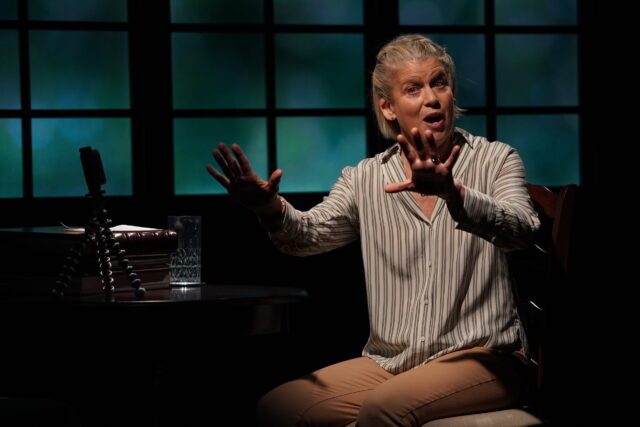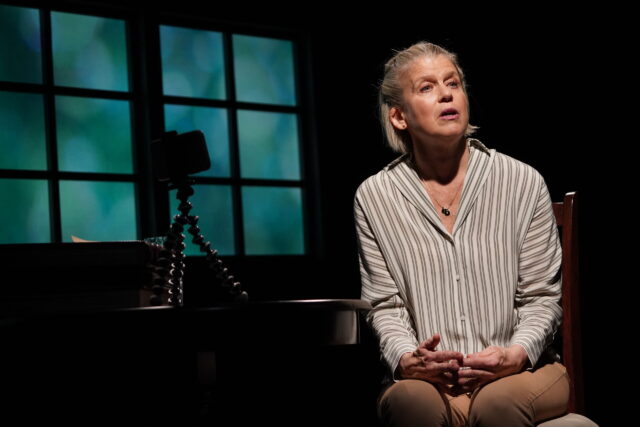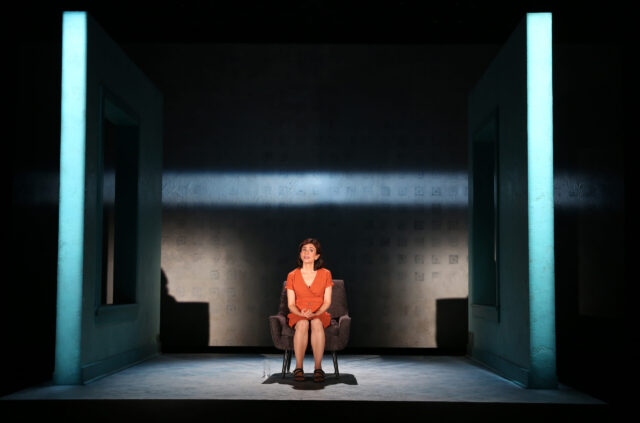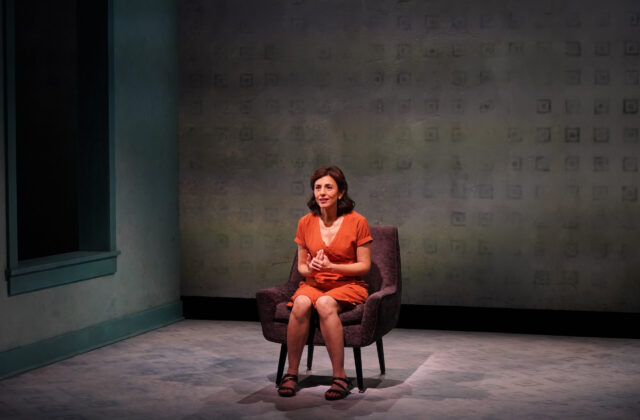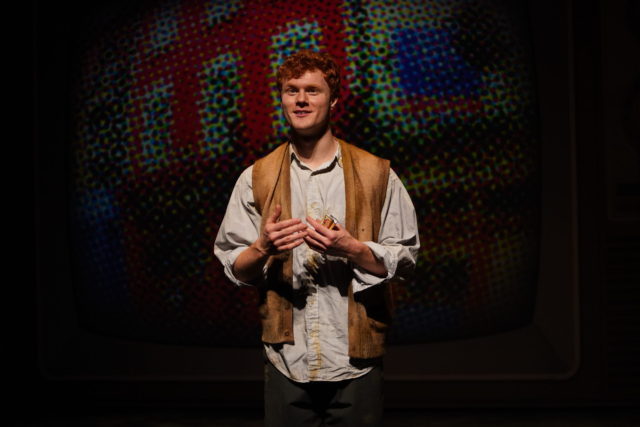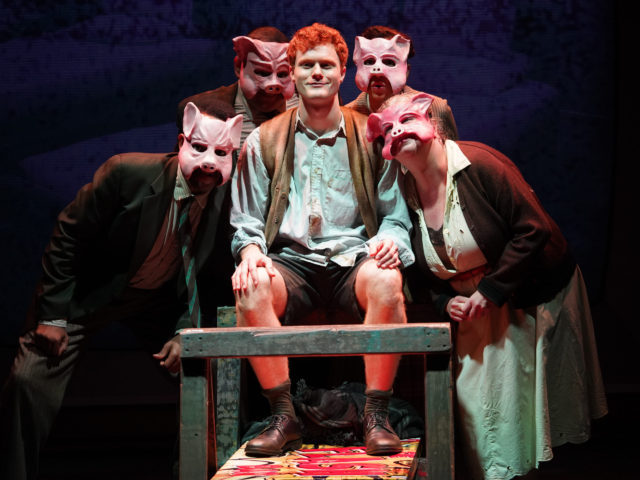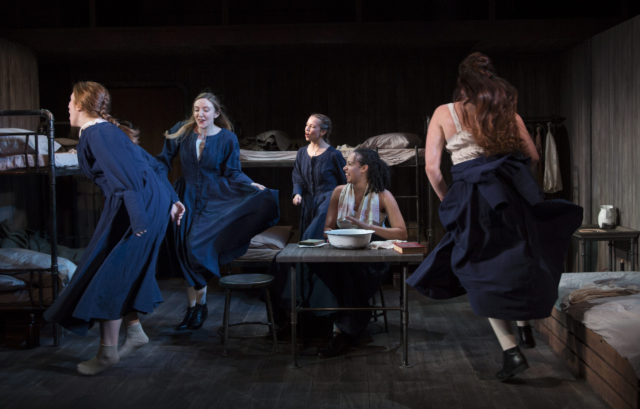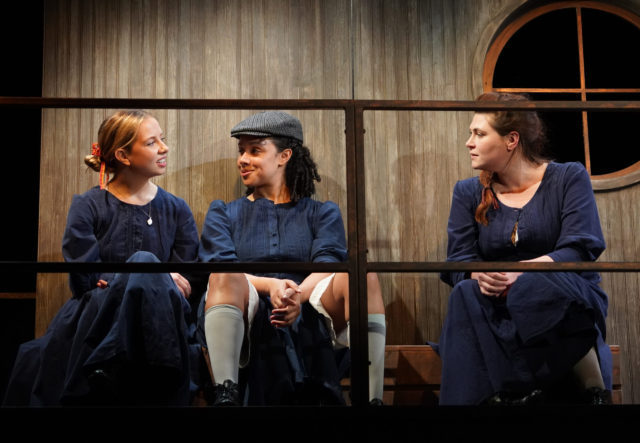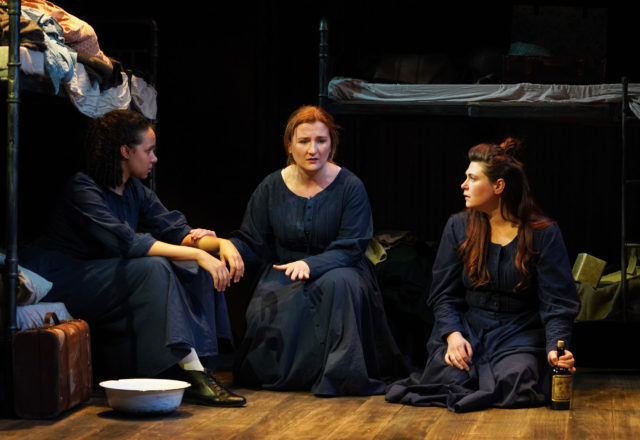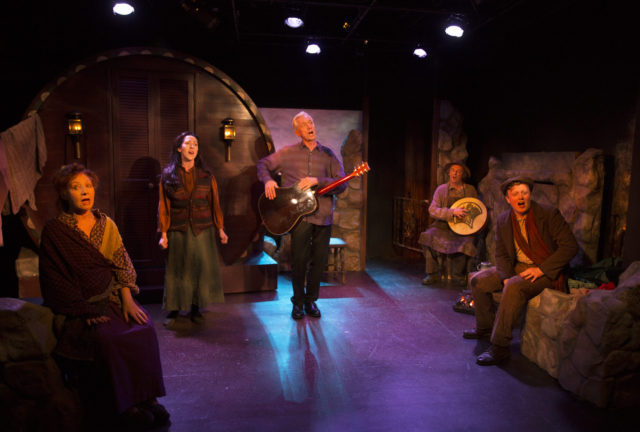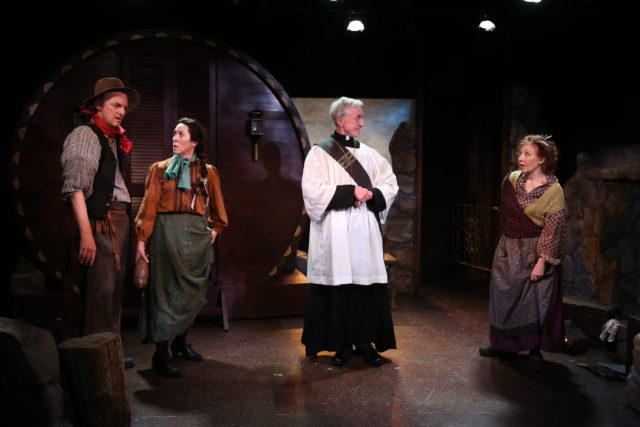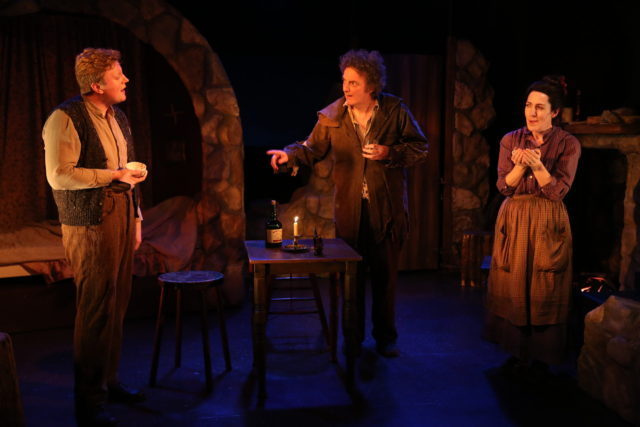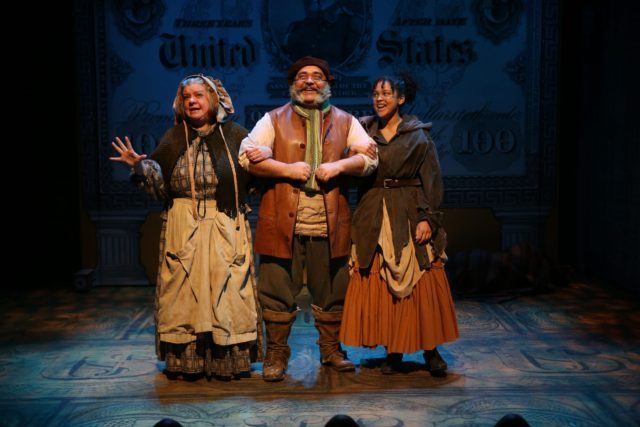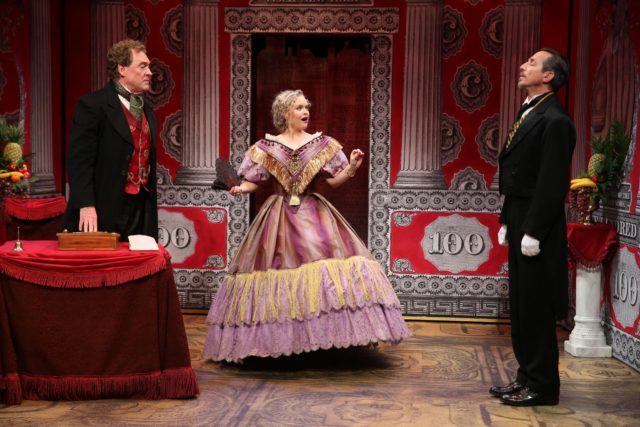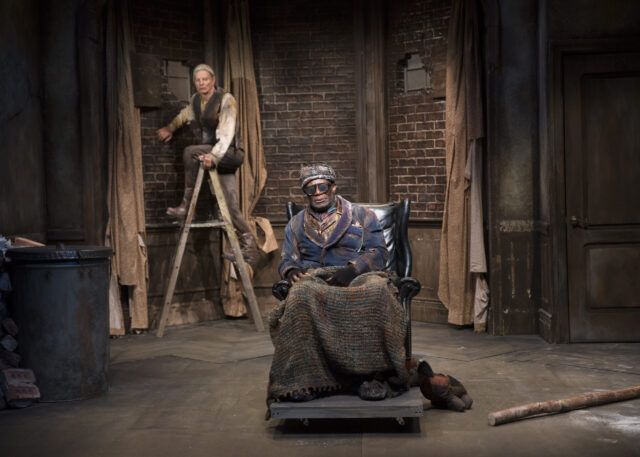
Clov (Bill Irwin) peers at Hamm (John Douglas Thompson) in Irish Rep adaptation of Beckett’s Endgame (photo by Carol Rosegg)
ENDGAME
Irish Repertory Theatre, Francis J. Greenburger Mainstage
132 West 22nd St. between Sixth & Seventh Aves.
Wednesday – Sunday through April 9, $25-$95
212-727-2737
irishrep.org
The Queen’s Pawn Opening is one of the safest first moves in chess. But there’s not much that’s safe in Samuel Beckett’s Endgame, which is named after the strategic maneuverings when there are only a few pieces left on the board and the match is approaching its conclusion.
The end is near from the very beginning of Endgame, as Clov (Bill Irwin) declares, “Finished, it’s finished, nearly finished, it must be nearly finished.” That opening salvo leads to eighty-five minutes of thrilling confusion as four characters face the end of everything in a seemingly postapocalyptic world. “I can’t be punished any more,” Clov claims, since for him life is nothing but suffering.
Clov, who limps severely, is a servant toiling for the mysterious, blind Hamm (John Douglas Thompson), a regal, angry figure in a homemade wheelchair: a chair attached to a wooden platform with wheels on it. When we first see Hamm, his face is covered by a bloody handkerchief; beneath it, he wears steampunk goggles. A ratty blanket is wrapped around his lower half; he can’t see or walk.
To Hamm’s right is a pile of garbage and two metal trash cans, where his “accursed progenitors” reside, his father, Nagg (Joe Grifasi), and mother, Nell (Patrice Johnson Chevannes), who have no legs. Thus, three of the characters cannot move on their own, and the fourth has major difficulty getting around. Even Hamm’s dog, a stuffed toy, is missing an appendage.
“Oh, I am willing to believe they suffer as much as such creatures can suffer,” Hamm says. “But does that mean their sufferings equal mine? No doubt. No, all is a — [yawns] — bsolute, the bigger a man is the fuller he is. And the emptier. . . . Enough, it’s time it ended, in the shelter, too. And yet I hesitate, I hesitate to . . . to end. Yes, there it is, it’s time it ended and yet I hesitate to — [yawns] — to end.”
Hamm, Clov, Nell, and Negg are living in some kind of end times, in a dingy basement dungeon that resembles a dark corner alley. Occasionally, Hamm calls for Clov to look through two small windows behind a brick wall in the back. To do so, Clov has to get out a step ladder, struggle uncomfortably to the wall, go up the ladder dragging one of his legs, and then peer through the gaps with a small telescope. On one side is a dim landscape, the other the sea, with nary a human being anywhere.
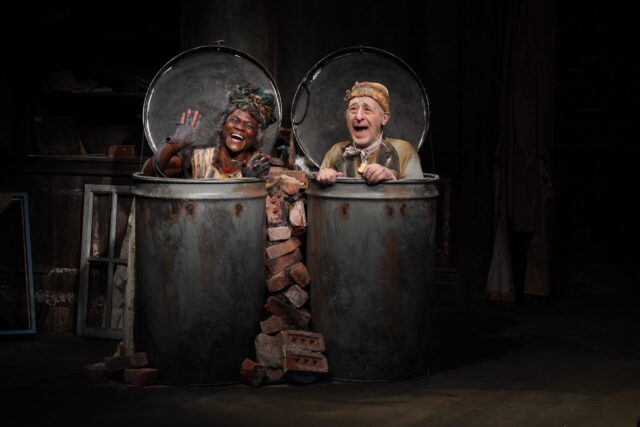
Nell (Patrice Johnson Chevannes) and Nagg (Joe Grifasi) share a laugh in Endgame (photo by Carol Rosegg)
However, when Clov aims the glass at the audience, he says, “I see . . . a multitude . . . in transports . . . of joy.” It’s one of several moments when the characters acknowledge that they are in a play with people watching them. Later, Clov threatens to leave, asking Hamm, “What is there to keep me here?” Hamm responds, “The dialogue.”
Hamm also makes references to “asides” and a “soliloquy”; when he calls for his gaff, Clov brings him the spear with a hook (used for fishing, sailing, and impaling), which resembles the vaudeville hook that unceremoniously pulls performers offstage when their acts go sour. In England, “gaff” is slang for “home,” something the four characters don’t exactly have. Scanning his surroundings, Hamm tells Clov, “My house a home for you. . . . But for Hamm, no home.”
The characters are like chess pieces, unable to move well on their own. “Take me for a little turn,” Hamm commands Clov, who awkwardly pushes him slowly around the room until Hamm barks, “Back to my place! Is that my place? . . . Put me right in the center!” as if he is the king on a chessboard demanding to be returned to his noble space, where he rules over nothing, the end in view, and not necessarily unwelcome. “The whole place stinks of corpses,” Hamm says. “The whole universe,” Clov adds. “To hell with the universe,” Hamm spits out. A few beats later, Clov declares, “The end is terrific!”
The cast is also terrific in this solid if not-quite-spectacular adaptation, directed by Ciarán O’Reilly. Longtime Shakespeare and August Wilson stalwart Thompson (Jitney, The Merchant of Venice) is majestic as Hamm in his return to the Irish Rep, where in 2009 he portrayed the title character in O’Reilly’s adaptation of Eugene O’Neill’s The Emperor Jones, spending much of the time on an oversized, red-draped throne. When Hamm calls out, “My kingdom for a nightman!,” it feels like a nod to Thompson’s numerous Bard performances, which do not include playing Richard III. However, the whistle Hamm keeps blowing grows ever-more annoying.
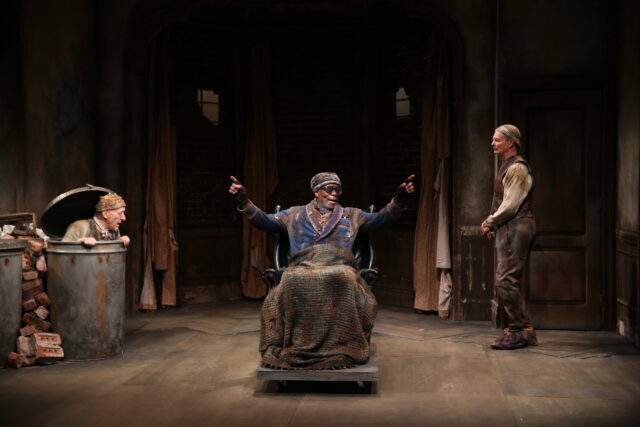
Hamm (John Douglas Thompson) sits center stage throughout Beckett adaptation at Irish Rep (photo by Carol Rosegg)
Tony winner Irwin (Old Hats, Who’s Afraid of Virginia Woolf?) is sublime as the put-upon Clov, a role that fits him to a T; Irwin is a vaudeville-style clown who has played Vlad and Lucky in Beckett’s Waiting for Godot and Hamm in a 2012 revival of Endgame in San Francisco as well as starring in his one-man show On Beckett, which was staged at the Irish Rep in 2018 and again (online) during the pandemic lockdown.
Chevannes (runboyrun/In Old Age, I’m Revolting) and Grifasi (Dinner at Eight, The Boys Next Door) are hilarious as Hamm’s parents, whose bins are just far enough apart to prevent them from kissing, an apt metaphor for the lack of connection that comes with the end (and with pandemics).
Charlie Corcoran’s dingy set evokes the end times, along with Orla Long’s costumes, which seem to decay right on the characters’ bodies. Michael Gottlieb’s lighting and M. Florian Staab’s sound enhance the dread, with fun props by Deirdre Brennan that ratchet up the humor. The eighty-five-minute play, which Beckett claimed was his personal favorite, debuted at the Royal Court in London in 1957 and was previously presented at the Irish Rep in 2005, directed by Charlotte Moore and starring Tony Roberts as Hamm, Adam Heller as Clov, Kathryn Grody as Nell, and Alvin Epstein as Nagg. (Epstein portrayed Clov in the show’s 1958 New York debut at the Cherry Lane and was also Nagg in the 2008 BAM revival, with Elaine Stritch as Nell, Max Casella as Clov, and John Turturro as Hamm.)
After explaining, “Nothing is funnier than unhappiness,” one of the show’s most famous and enduring lines, Nell tells Nagg, “We laugh, with a will, in the beginning. But it’s always the same thing. Yes, it’s like the funny story we have heard too often, we still find it funny, but we don’t laugh any more.” There are plenty of laughs in this version of Endgame, even as we may be edging closer and closer to the apocalypse.
